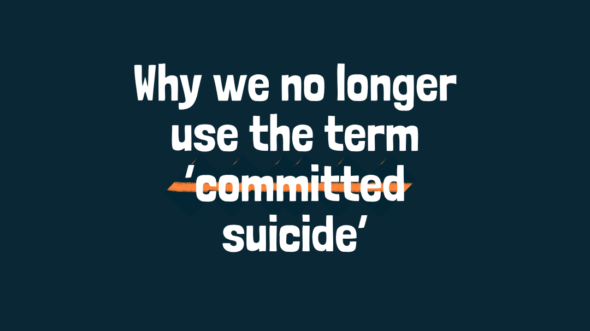The Weight of Words: Why it’s time to stop using the phrase ‘committed suicide’
2 May 2024

2 May 2024

For decades, the term “committed suicide” has been widely used to describe the act of taking one’s own life. However, as awareness around mental health and suicide prevention grows, so does the recognition of the harmful implications of using such language.
Words carry immense weight, and the term “committed suicide” carries connotations of criminality and wrongdoing, rooted in historical and religious contexts where suicide was considered a sin or a crime. This language perpetuates stigma and shame, further marginalizing those affected by suicide and hindering efforts to promote understanding and support.
By shifting our language away from such terms we can foster a more empathetic and inclusive dialogue and reduce the dangerous stigma surrounding it.
Using phrases like “died by suicide” or “took their own life” acknowledges the complexity of suicide while avoiding judgment and blame.
This linguistic shift encourages compassion and understanding, creating space for open conversations about mental health and suicide prevention.
For the loved ones left behind, language matters immensely. The term “committed suicide” can compound feelings of guilt, shame, and isolation, adding an unnecessary burden to their grief.
By using more respectful and compassionate language, we validate the experiences of those bereaved by suicide and honour the memory of those they’ve lost. Language that acknowledges the pain and struggles of individuals who died by suicide helps those left behind feel seen and supported in their healing.
By reframing our language, we can also promote prevention efforts and encourage individuals to seek the help they need without fear of judgment or stigma.
When we use phrases that are respectful and non-judgmental, we create an environment where people feel safe reaching out for support and accessing mental health resources.
As advocates for suicide prevention, we must lead by example in our language choices. We have a unique opportunity to set the standard for compassionate communication around suicide. By consciously choosing our words and encouraging others to do the same, we can help dismantle the stigma surrounding suicide and create a more supportive and understanding society.
Language has the power to either uplift or oppress so let’s start embracing language that respects the experiences of suicide survivors to foster a culture of empathy, support, and prevention.
Together, let’s choose our words wisely and create a world where no one feels alone in their struggles with mental health.
Follow us on Social Media.

Subscribe for the latest newsletter updates.